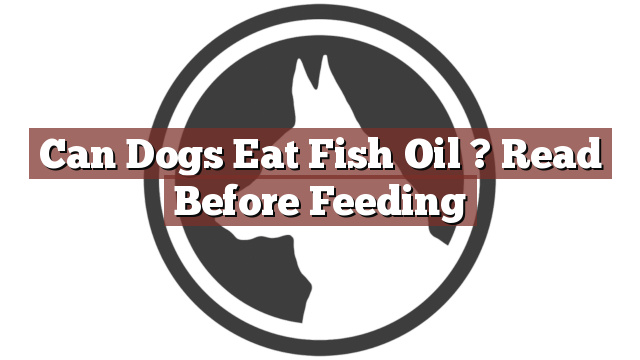Understanding Your Dog’s Dietary Needs
As a responsible dog owner, it is crucial to be well-informed about your furry friend’s dietary needs. A balanced diet plays a vital role in maintaining your dog’s overall health and well-being. While dogs primarily thrive on a diet consisting of high-quality commercial dog food, it is common for pet owners to wonder if they can supplement their dog’s diet with other foods like fish oil.
Can Dogs Eat Fish Oil? Read Before Feeding
Can dogs eat fish oil? The answer is yes. Fish oil can be a beneficial addition to your dog’s diet, thanks to its high omega-3 fatty acid content. Omega-3 fatty acids, such as EPA (eicosapentaenoic acid) and DHA (docosahexaenoic acid), offer numerous health benefits for dogs. They support a healthy coat and skin, promote joint health, boost the immune system, and aid in brain development.
Fish oil can be obtained from various sources such as salmon, sardines, and mackerel. It is available in liquid form or as capsules for easier administration. However, it is vital to consult your veterinarian before adding fish oil to your dog’s diet, as they can provide specific guidance tailored to your dog’s individual needs.
Pros and Cons of Feeding Fish Oil to Dogs
Feeding fish oil to your dog has several advantages. The omega-3 fatty acids found in fish oil have anti-inflammatory properties that can alleviate joint pain and stiffness, making it particularly beneficial for dogs with arthritis or other joint issues. These fatty acids also aid in reducing dry skin and itchiness, resulting in a healthier and shinier coat for your furry companion. Additionally, fish oil can support heart health and boost the immune system, helping your dog stay active and energetic.
While fish oil offers many benefits, it is crucial to consider potential drawbacks. Fish oil can sometimes cause gastrointestinal upset in dogs, leading to diarrhea, vomiting, or a fishy odor in their breath. It can also interact with certain medications, so it is important to consult your veterinarian before introducing fish oil to your dog’s diet. Moreover, it is essential to choose high-quality fish oil supplements that are free from contaminants such as mercury, as these can be harmful to your dog’s health.
In Conclusion: Considerations for Feeding Fish Oil to Your Dog
In conclusion, yes, dogs can eat fish oil and benefit from its omega-3 fatty acids. However, it is essential to consult your veterinarian before incorporating fish oil into your dog’s diet. They can provide advice on the appropriate dosage and guide you on selecting a reputable fish oil supplement. Always monitor your dog’s response to fish oil and watch out for any adverse effects. By understanding your dog’s dietary needs and making informed choices, you can help ensure a healthy and happy life for your beloved four-legged companion.
Thank you for taking the time to read through our exploration of [page_title]. As every dog lover knows, our furry friends have unique dietary needs and responses, often varying from one canine to another. This is why it's paramount to approach any changes in their diet with caution and knowledge.
Before introducing any new treats or making alterations to your dog's diet based on our insights, it's crucial to consult with a veterinarian about [page_title]. Their expertise ensures that the choices you make are well-suited to your particular pet's health and well-being.
Even seemingly harmless foods can sometimes lead to allergic reactions or digestive issues, which is why monitoring your dog after introducing any new food item is essential.
The content provided here on [page_title] is crafted with care, thorough research, and a genuine love for dogs. Nevertheless, it serves as a general guideline and should not be considered a substitute for professional veterinary advice.
Always prioritize the expert insights of your veterinarian, and remember that the health and happiness of your furry companion come first.
May your journey with your pet continue to be filled with joy, love, and safe culinary adventures. Happy reading, and even happier snacking for your canine friend!

